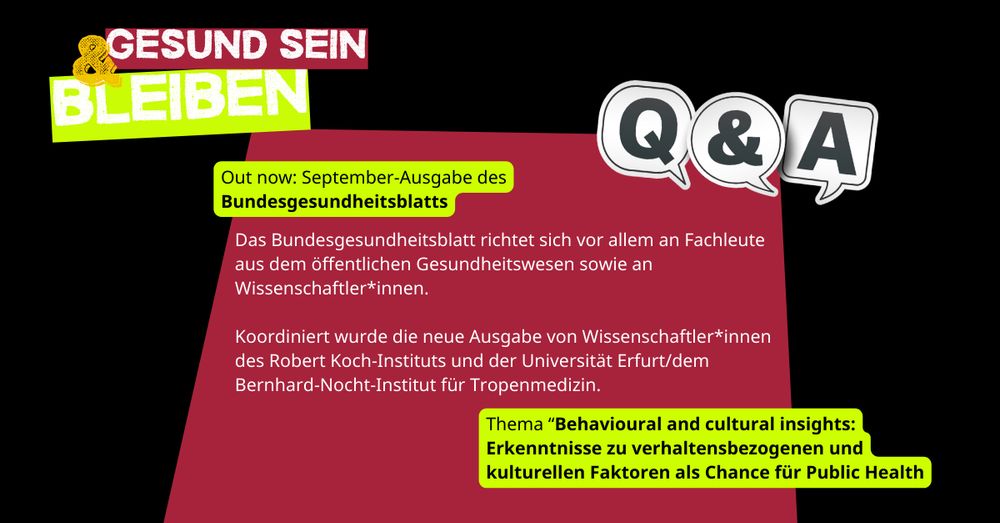
📖 Die neue Ausgabe des #Bundesgesundheitsblatts @springernature.com widmet sich #BCI. Sie richtet sich vor allem an Fachleute im Gesundheitswesen 👩⚕️👨🔬 & liefert fundierte Infos zu Forschung & Gesundheitsschutz. Mitkoordiniiert wurde sie u.a. von @corneliabetsch.bsky.social @unierfurt.bsky.social
29.08.2025 12:52 — 👍 2 🔁 1 💬 1 📌 1
congrats @wilhelmhofmann.bsky.social ! #applynow
30.08.2025 13:01 — 👍 0 🔁 0 💬 0 📌 0

Das war ein großer Spass! Fast einen ganzen Tag Ideen zu Fragen der planetaren Gesundheit gewälzt - DANKE ❤️ Markus Reichstein @ellisunitjena.bsky.social und Team, @robertboehm.bsky.social und Geko Team des @ipb.bsky.social
#planetaryhealth #behavioralscience #climate #health #sciencebsky
14.08.2025 17:50 — 👍 6 🔁 2 💬 0 📌 1
More than happy to have the wonderful @robertboehm.bsky.social with us. Fun will now commence! 🖖 Welcome, dear Robert ❤️ www.uni-erfurt.de/institute-fo...
11.08.2025 11:45 — 👍 3 🔁 0 💬 1 📌 0
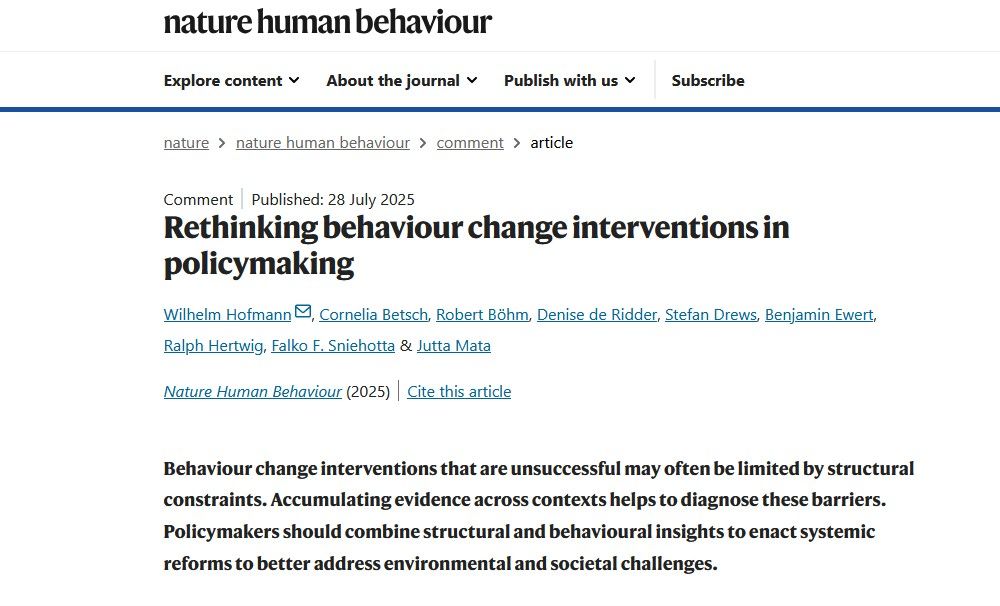
Comment: Rethinking behavior change interventions in policymaking
📢 New commentary out today in Nature Human Behaviour!
We argue that behavior change interventions often suffer from a one-sided success focus. But failures may reveal structural barriers people face.
🔗 rdcu.be/ex8hR
#BehavioralScience #PublicPolicy
28.07.2025 10:38 — 👍 46 🔁 22 💬 2 📌 2
I would never have thought that academia and science would be the first to bend their knees.
21.02.2025 18:11 — 👍 79 🔁 16 💬 4 📌 0
#DefendResearch Wissenschaftsfreiheit ist ein hohes Gut. In den USA ist sie stark unter Druck. Hier rufen US-Wissenschaftler*innen die wissenschaftliche community dazu auf, gemeinsam mit ihnen Widerstand zu leisten tinyurl.com/2dyadwzr #resistanceisneverfutile
21.02.2025 10:47 — 👍 7 🔁 5 💬 0 📌 0
Danke für ein Gespräch über Star-Trek Liebe, die Frage nach der Natur des Bösen und was das Abspalten und Wegsperren des Bösen alles mit unserem Leben heute zu tun hat, wie wir unsere Werte verteidigen und was man immer wieder neu in derselben guten alten Folge Next Generation finden kann.
21.02.2025 09:45 — 👍 1 🔁 0 💬 1 📌 0

Impfskepsis: Welche Maßnahmen erhöhen die Impfbereitschaft?
Masern- und Keuchhustenfälle steigen in den USA, die Impfbereitschaft sinkt. Forscher Korn sieht fehlendes Vertrauen und geringe Risikowahrnehmung als Ursachen.
#InDenMedien Unser Mitglied Lars Korn, Forscher am BNITM, hat jetzt mit @kathrinkuehn.bsky.social vom Deutschlandfunk in "Forschung aktuell" über Impfskepsis gesprochen. Doch welche Maßnahmen erhöhen die Impfbereitschaft? Jetzt reinhören👇 @unierfurt.bsky.social
15.01.2025 15:56 — 👍 4 🔁 1 💬 0 📌 1
Das wird richtig spannend und dementsprechend groß ist auch bereits der Andrang!
28.01.2025 15:07 — 👍 3 🔁 1 💬 0 📌 0
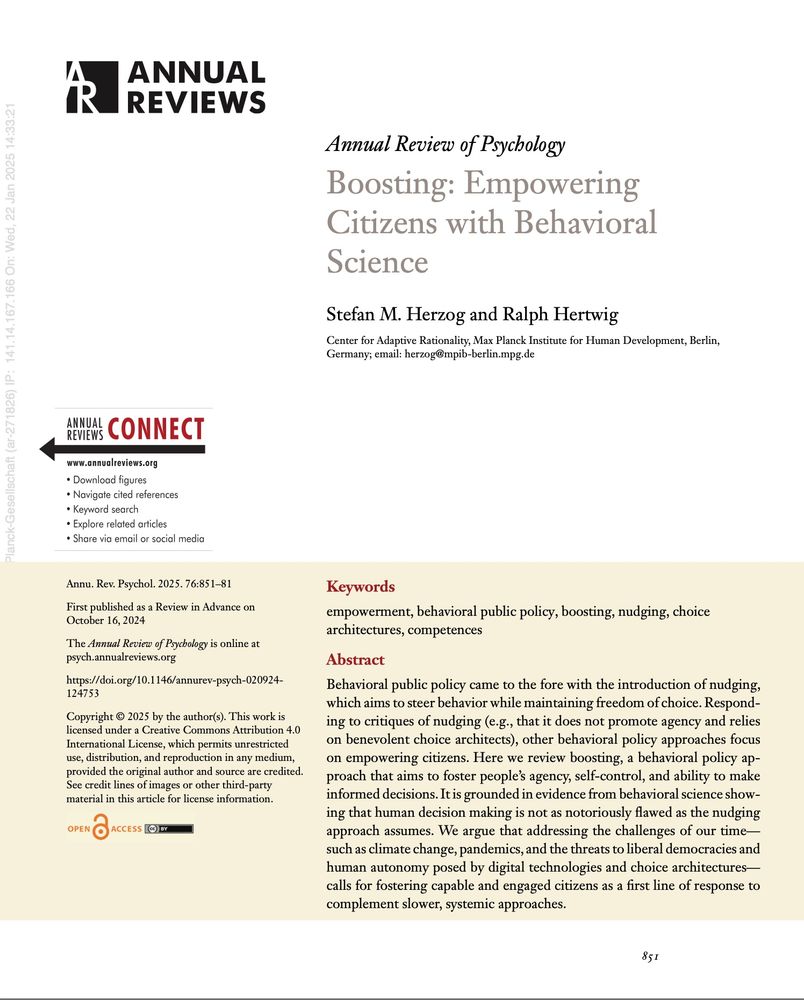
The image is the cover page of an article from the "Annual Review of Psychology" titled "Boosting: Empowering Citizens with Behavioral Science" by Stefan M. Herzog and Ralph Hertwig. It features a brief abstract, keywords, and publication details. The abstract outlines the concept of "boosting" as a behavioral public policy that emphasizes empowering individuals to make informed decisions, in contrast to "nudging," which subtly steers behavior. The abstract reads:
Behavioral public policy came to the fore with the introduction of nudging, which aims to steer behavior while maintaining freedom of choice. Responding to critiques of nudging (e.g., that it does not promote agency and relies on benevolent choice architects), other behavioral policy approaches focus on empowering citizens. Here we review boosting, a behavioral policy approach that aims to foster people's agency, self-control, and ability to make informed decisions. It is grounded in evidence from behavioral science showing that human decision making is not as notoriously flawed as the nudging approach assumes. We argue that addressing the challenges of our time—such as climate change, pandemics, and the threats to liberal democracies and human autonomy posed by digital technologies and choice architectures—calls for fostering capable and engaged citizens as a first line of response to complement slower, systemic approaches.
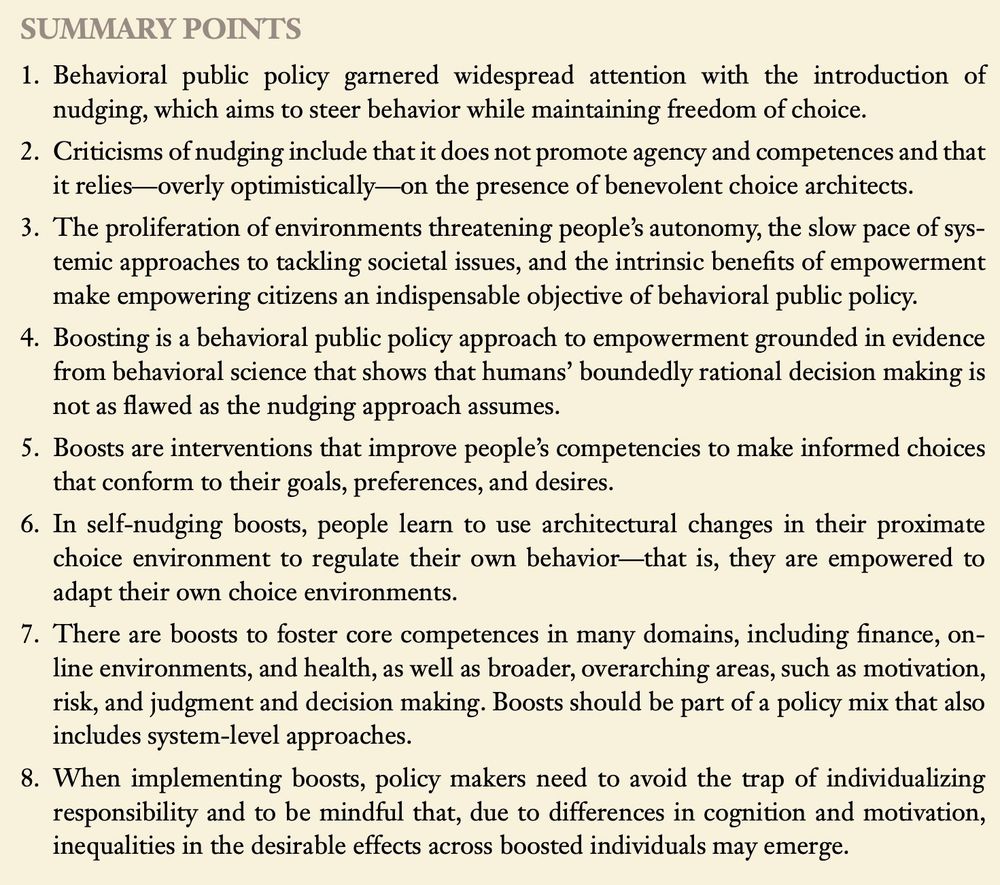
List with summary points:
1. Behavioral public policy garnered widespread attention with the introduction of nudging, which aims to steer behavior while maintaining freedom of choice.
2. Criticisms of nudging include that it does not promote agency and competences and that it relies—overly optimistically—on the presence of benevolent choice architects.
3. The proliferation of environments threatening people's autonomy, the slow pace of systemic approaches to tackling societal issues, and the intrinsic benefits of empowerment make empowering citizens an indispensable objective of behavioral public policy.
4. Boosting is a behavioral public policy approach to empowerment grounded in evidence from behavioral science that shows that humans’ boundedly rational decision making is not as flawed as the nudging approach assumes.
5. Boosts are interventions that improve people's competencies to make informed choices that conform to their goals, preferences, and desires.
6. In self-nudging boosts, people learn to use architectural changes in their proximate choice environment to regulate their own behavior—that is, they are empowered to adapt their own choice environments.
7. There are boosts to foster core competences in many domains, including finance, online environments, and health, as well as broader, overarching areas, such as motivation, risk, and judgment and decision making. Boosts should be part of a policy mix that also includes system-level approaches.
8. When implementing boosts, policy makers need to avoid the trap of individualizing responsibility and to be mindful that, due to differences in cognition and motivation, inequalities in the desirable effects across boosted individuals may emerge.
🌟🧠💪📝
#BOOSTING: Empowering citizens with behavioral science
New, freely available paper in Annual Review of Psychology.
PDF: tinyurl.com/boosting2025
For more: scienceofboosting.org
@arc-mpib.bsky.social @mpib-berlin.bsky.social
@annualreviews.bsky.social
#policy #behavioralscience
1/ 🧵👇
23.01.2025 10:54 — 👍 93 🔁 41 💬 2 📌 5

Themenauswahl für Stellungnahmen
Heute Sitzung des Deutschen Ethikrats mit öffentlichem Teil - wir stellen 5 potenzielle Stellungnahmethemen vor. Herzliche Einladung: www.ethikrat.org/veranstaltun... Pflege - Schwangerschaft - Neurotechnologie - Freiheit & Verantwortung - Lebensende
23.01.2025 13:11 — 👍 4 🔁 0 💬 0 📌 0
Größte Vorfreude! Kommt, lasst uns über Zukunft reden! Mit Sebastian Göttling und Simon Fistrich, den wunderbaren Hosts von trekamdienstag.de Podcast 🖖 Morgen an Nikolaus ein Stündchen zur Mittagszeit, 13 Uhr hier: uni-erfurt.webex.com/uni-erfurt/j...
05.12.2024 16:56 — 👍 7 🔁 2 💬 1 📌 1
Heiße Empfehlung - @robertboehm.bsky.social sucht Doktorand*innen. Eine fantastische Arbeitsgruppe mit dem hellsten Kopf und großem Drive. Gesellschaftlich immer am Puls der Zeit und richtig gute Forschung. Bewerben! Und bitte weitersagen!
06.06.2024 06:56 — 👍 2 🔁 0 💬 0 📌 0
Forschung ist Weltoffenheit! "Science knows no country, because knowledge belongs to humanity and is the torch that illuminates the world." (Pasteur). Mit Tausenden anderen setzen wir daher ein sichtbares Zeichen: Für die Demokratie thueringen-weltoffen.de
25.01.2024 09:23 — 👍 50 🔁 14 💬 1 📌 1
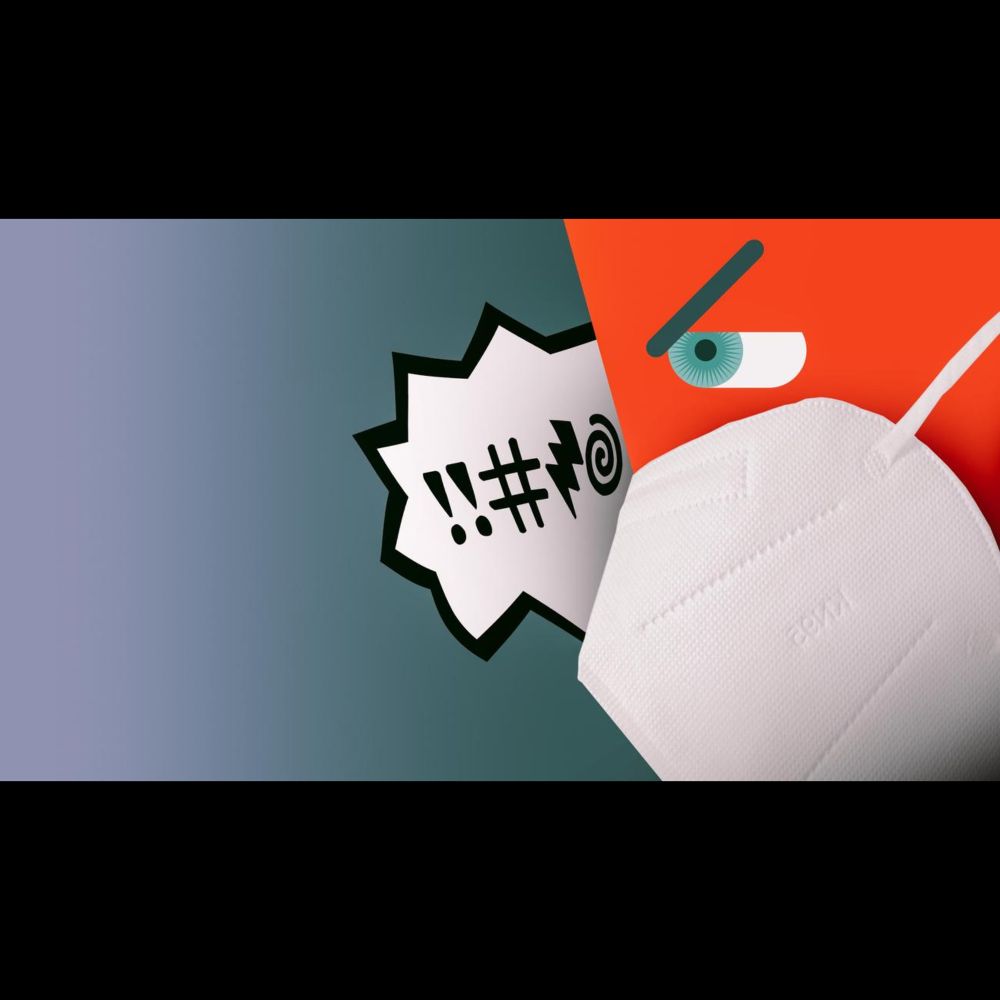
Aufarbeitung der Corona-Pandemie: Das Virus in den Köpfen
Eine Studie zeigt, dass viele die Pandemiemaßnahmen für reine Gängelung halten. Aber auch die Gegenseite erinnert sich falsch. Das ist eine Gefahr für die Zukunft.
Corona-Pandemie, Erinnerung und Aufarbeitung – sehr interessante Studie mit Umfragen in 11 Ländern.
- Kurze Zusammenfassung: www.spiegel.de/gesundheit/d...
- Sehr lesenswerte Betrachtung, auch über die Pandemie hinaus: www.zeit.de/gesundheit/2...
- Studie selber: www.nature.com/articles/d41...
02.11.2023 10:09 — 👍 64 🔁 37 💬 6 📌 1

In der Pandemie wurde Gesundheitsverhalten wie Impfen oder Nicht-Impfen für viele zum Teil ihrer Identität. Daraus entstehen Konflikte, die bis heute andauern. Unser neues Paper in Nature zeigt, wie unser aller Nachdenken über die Pandemie verzerrt ist nature.com/articles/s41...
02.11.2023 10:10 — 👍 114 🔁 41 💬 8 📌 4
We are hiring! Looking for a new colleague (and my office neighbor) to become PROFESSOR (FULL) OF WORK AND ORGANIZATIONAL PSYCHOLOGY at the Faculty of Psychology, University of Vienna. Please repost & share with potentially interested colleagues. shorturl.at/biyNT Vienna rocks! @univie.ac.at
01.11.2023 01:59 — 👍 18 🔁 19 💬 0 📌 2
(machine) learning @ MPI BGC
✨ https://vitusbenson.github.io/
Ph.D. student at MPI BGC + VU IVM ( & MYRIAD-EU ) exploring (multi-)hazards and impacts. MS Geography - ECU | BS Meteorology - NC State | She/Her
KelleyDePolt.com
PhD candidate @ippad_eu, @UvA_Amsterdam | Formerly MSc Psychology @Uniheidelberg | http://mastodon.world/@jakobkasper
Professor of Practical Philosophy, Stockholm University & Institute for Futures Studies. He/Him. Author of How Economics Can Save the World 🛟 a.co/d/0AZASJz Web: https://linktr.ee/erikangner Opinions &c. my own. Agent: JP Marshall #Econsky #Philsky
Here to share The Transparent and Open Science Game: https://osf.io/t9ngd/
boredom | empathy | pro- and antisocial behavior and traits | pasta | Aarhus University
Das wichtigste wissenschaftspolitische Beratungsgremium in Deutschland.
⚖️ https://www.wissenschaftsrat.de/impressum
▶️ youtube.com/@wissrat
🎙️ https://9te-etage.podigee.io
Podcaster bei Trek am Dienstag und Zauberlaterne. Oft Gast in der Rückspultaste.
Podcast-Macher, Storyteller, Metal
'Erst denken, dann lenken' – unbekannter Philosoph, Phantasialand, Walzertraum, um 1993
Der Deutsche Ethikrat berät Gesellschaft und Politik zu ethischen Fragen, die sich sich v.a. aus den Lebenswissenschaften ergeben. Hier teilt die Geschäftsstelle Themen, Veranstaltungen und Publikationen.
Impressum: www.ethikrat.org/impressum/
Das Leitmedium auf Bluesky
Herzlich willkommen auf dem offiziellen Account der Universität Erfurt.
Impressum: http://uni-erfurt.de/uni/impressum/
Die DFG ist die größte Forschungsförderorganisation und die Selbstverwaltungsorganisation der Wissenschaft in Deutschland.
www.dfg.de
Impressum: https://www.dfg.de/de/service/kontakt/impressum
Social Media-Netiquette: https://www.dfg.de/de/service/presse
The Antimicrobials: Behaviour and Cognition Network is a global community of interdisciplinary researchers with a joint vision of tackling antimicrobial resistance through behavioural science approaches.
https://www.a-bc.network/
Professor & Head of ID at Charité Berlin & Berlin Institute of Health
German-Norwegian physician-scientist interested in Infectious diseases, respiratory medicine, vaccines & immunity,
„friluftsliv“, cycling, music, democracy.
Behavioral scientist studying judgment and decision making in response to societal challenges; robertboehm.info; Professor @univie.ac.at & @uniinnsbruck.bsky.social; Director https://whocc-sabrar.univie.ac.at; Co-director https://health.univie.ac.at/en/
✍️ Print & Online 🙌 Werbefrei 👊 Open-Source💥
Kommunikationsleitung bei Stiftung Gesunde Erde - Gesunde Menschen
Gesellschafter bei Agentur w21k
Was Menschen gemacht haben, können Menschen auch verändern.
Official account of the Institute for Planetary Health Behaviour at @unierfurt.bsky.social.
Understanding and fostering Planetary Health Behaviour.
http://pace-studie.de
https://www.uni-erfurt.de/go/ipb (Imprint)
MD&PostDoc-Health Communication:Infectious Diseases&Planetary Health/ @BNITM_de @IPB_Erfurt /Fellow at @thinktank30 Club of Rome Germany/ posts: own view









